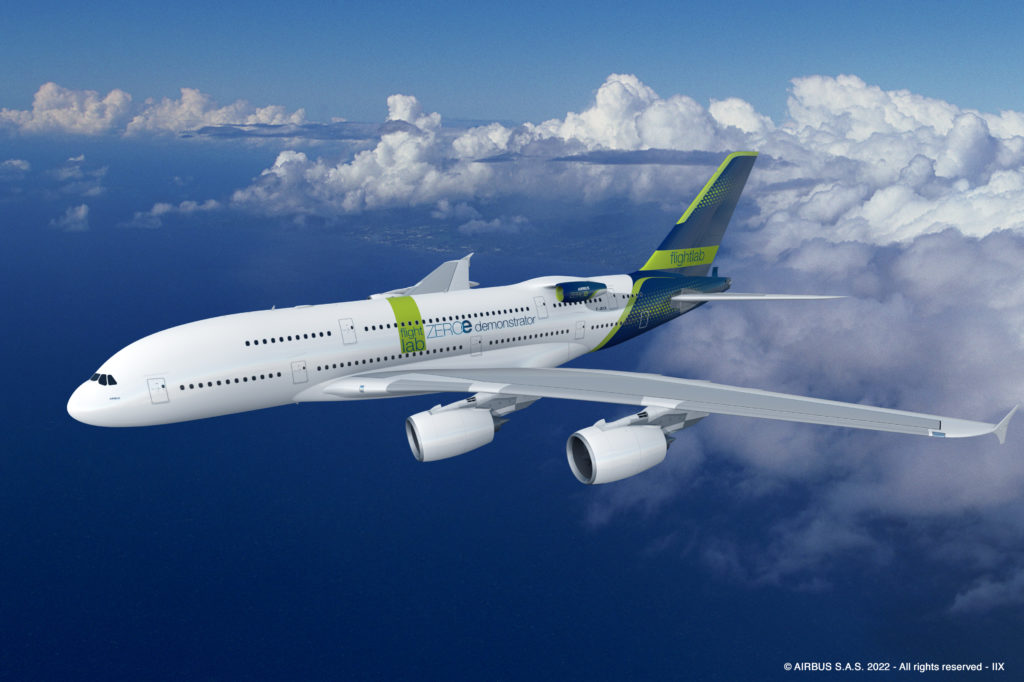Airbus is betting on Hydrogen being the fuel that will power the next iteration of aircraft, which will be sustainable as well, and had announced in 2021 at the Airbus Sustainability Summit about their expectation to take it to commercial standards by 2035. To this effect, it made a couple of announcements which build on the announcements of 2020 and 2021.
The Airbus A380 ZEROe demonstrator
Airbus has decided to use the first-ever A380 to roll off the production line, MSN1, as the testbed for to its future testing to make zero-emission aviation to reality. Airbus has previously used the A380 MSN1 towards the testing and certification of the A380, and also for the engines of the A350-1000. The A380 MSN1 test aircraft has now been earmarked for a new role: to take the lead on testing the technologies that will be vital to bringing the world’s first zero-emission aircraft to market by 2035.

Airbus Vice-President, Zero-Emission Aircraft, Glenn Llewellyn took to shooting a video to take us inside the A380 MSN1 that will act as a testbed for hydrogen combustion technology.
“The A380 MSN1 is an excellent flight laboratory platform for new hydrogen technologies,” says Mathias Andriamisaina, Airbus ZEROe Demonstrator Leader. “It’s a safe and reliable platform that is highly versatile to test a wide range of zero-emission technologies. In addition, the platform can comfortably accommodate the large flight test instrumentation that will be needed to analyse the performance of the hydrogen in the hydrogen-propulsion system.”
A demonstrator aircraft is fundamental to developing new aviation technology. It is primarily used to test and prove the viability of designs, processes, fuels, materials and equipment, both on the ground and in the air. This information is then used to refine and certify the finished product. Demonstrators also serve to showcase innovation to a wider audience, from government officials and investors to journalists and the general public.
The ZEROe demonstrator will now be the next to test zero-emission technologies. It will carry four liquid hydrogen tanks in a caudal position, as well as a hydrogen combustion engine mounted along the rear fuselage. The liquid hydrogen distribution system will feed into a conditioning system in which the liquid hydrogen will transform into its gaseous form before it is introduced into the engine where it is combusted for propulsion.

Airbus partners CFM to power Hydrogen Combustion
Airbus has also signed a partnership agreement with CFM International, a 50/50 joint company between GE and Safran Aircraft Engines, to collaborate on a hydrogen demonstration programme that will take flight around the middle of this decade.
The programme’s objective is to ground and flight test a direct combustion engine fueled by hydrogen, in preparation for entry-into-service of a zero-emission aircraft by 2035. The demonstration will use the A380 flying testbed equipped with liquid hydrogen tanks prepared at Airbus facilities in France and Germany. Airbus will also define the hydrogen propulsion system requirements, oversee flight testing, and provide the A380 platform to test the hydrogen combustion engine in cruise phase.
CFM International (CFM) will modify the combustor, fuel system, and control system of a GE Passport turbofan to run on hydrogen. The engine, which is assembled in the US, was selected for this program because of its physical size, advanced turbo machinery, and fuel flow capability. It will be mounted along the rear fuselage of the flying testbed to allow engine emissions, including contrails, to be monitored separately from those of the engines powering the aircraft. CFM will execute an extensive ground test program ahead of the A380 flight test.
Bottomline
Airbus is first off the mark as a big aviation OEM to channel its efforts towards sustainable aviation into a publicly announced project, and is moving forward with building the demonstrator atop an A380 aircraft now. Airbus expects the first flight to be in the middle of the decade, and expects to build a plane that will fly on hydrogen after.
What do you think about Airbus’ plans to decarbonise aviation?
Liked our articles and our efforts? Please pay an amount you are comfortable with; an amount you believe is the fair price for the content you have consumed. Please enter an amount in the box below and click on the button to pay; you can use Netbanking, Debit/Credit Cards, UPI, QR codes, or any Wallet to pay. Every contribution helps cover the cost of the content generated for your benefit.
(Important: to receive confirmation and details of your transaction, please enter a valid email address in the pop-up form that will appear after you click the ‘Pay Now’ button. For international transactions, use Paypal to process the transaction.)
We are not putting our articles behind any paywall where you are asked to pay before you read an article. We are asking you to pay after you have read the article if you are satisfied with the quality and our efforts.


It’s all very interesting and I’m a fan of fuel cell tech using hydrogen but in aircraft, it does make me pause slightly. I wonder if the engineers of the Hindenberg said “It’s a safe and reliable platform”?
This was really informative Post, thank you for sharing this, It was really helpful.